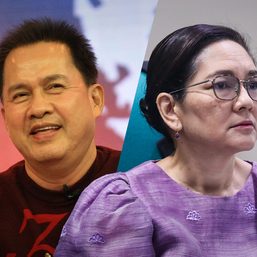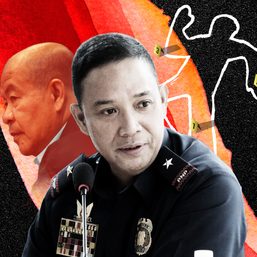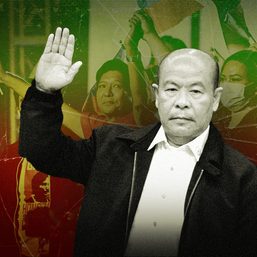SUMMARY
This is AI generated summarization, which may have errors. For context, always refer to the full article.
![[The Slingshot] The 1 valiant Davao group that stood up to Duterte](https://www.rappler.com/tachyon/2023/08/CASE-TL-aug-12-2023-1.jpg)
There was only one group in Davao City that made noise when the Davao Death Squad killings began to take place. They not only made noise, they documented the killings. Today, some of those valuable records have made its way to the International Criminal Court in The Hague.
No politicians had backed the group. Rodrigo Duterte cannot say it was politically motivated in a city that had no political opposition. In fact, it was composed of some lawyers, priests and religious, and NGOs. It is to them that we owe the stirrings of a conscience movement that went against the tide of Duterte populism right in the belly of the beast, Davao City.
The Coalition Against Summary Executions (CASE) was publicly launched on July 16, 2003 in a venue that was announced to media. Their message was unflinching – no one in Davao City has a license to kill: not the government officials and the police; that no one can arrogate unto himself the power of life and death over other people; that those who enforce the law must uphold the law, they are not above the law.
That same day, their faces were on the daily five o’clock news in the city’s television stations. That evening, one of the organizers, a priest, was interviewed on a radio talk show. The following day, the gist of the CASE message and the priest’s views on the summary executions were published by three of Davao City’s local dailies.
The first inkling of danger came from the priest’s confrere at his convent who pointedly asked him: “Are you not afraid that you have denounced Mayor Duterte and his death squad?” The priest replied: “I have already offered my life to God and I am prepared to accept the consequence of my prophetic stance. I am not afraid of Duterte and his death squad. I am not afraid to die.”
As early as 2003, even the mayor’s city hall officials were mouthing the Duterte line justifying the killings. Even the city tourism officer echoed that it was efficacious for tourism: “I call it the process of expurgation. Whoever is doing it, I say very good and thank you.”
In fact, the summary executions had reached the ranks of the CASE members. A year later, in late August of 2004, the peace advocate and NGO member Jun “Rashid” Manahan was gunned down in cold blood as he was on his way to a conference on summary executions. Only a year after it has come out in the open, the summary killings continued with impunity and had finally claimed the life of one of CASE’s own. That year alone, over 60 people were killed extrajudicially in Davao City.
Undaunted, CASE persisted with its voice in the wilderness.
By 2005, even the controversial Wikileaks of Julian Assange, using leaked diplomatic cables allegedly from the US embassy Manila, was using data from CASE on the Duterte killing sprees.
In 2009, confidential diplomatic cables apparently sent by US ambassador to Manila Kristie Kenney to the US secretary of state said she dispatched an embassy political officer to Davao City. Among those interviewed by the officer was CASE, in a bid to “assist civil society groups to pursue credible investigations into these crimes.” It said Davao City vice mayor Sara Duterte “brushed aside” the killings, saying these were just “regular murder cases.”
There already were traits of Dutertismo untouchability that the family had manifested as early as 2009. Sara was already covering up for her father’s sins. She said these killings were “exaggerated,” and were just the result of “revenge” and “love triangles.” It was under this political cover-up fabric that CASE was operating on. Given that, the tenacity of CASE was impressive.
After CASE was launched in 2003, some in local media had spoken up.
“Anybody can be murdered in Davao City,” said Carlos Conde, then of the local chapter of the National Union of Journalists of the Philippines. Part of the growing statistics in the early years was Jun Porres Pala, the hard-hitting radio commentator who openly critiqued Mayor Duterte, accusing him of corruption. Pala was gunned down on September 6, 2003.
Whereas before no discourses on the Davao City extrajudicial killings had reached the national level, in 2016 the Pala murder was discussed in the Philippine Senate. The confessed Duterte hitman Edgar Matobato testified that it was Duterte who ordered the killing of Pala, and made it appear it was the New People’s Army that was responsible for it. Pala was an anti-communist crusader who denounced NPA infiltration of Davao City neighborhoods.
Conde went on, “The administration of Mayor Rodrigo Duterte has instilled in the public the idea that it is okay to kill suspected criminals, that it is okay to slaughter children, that it is okay to snatch people in the middle of the night without warrants and without due process, that it is okay to subject the public to the fascistic might of the military as exemplified by the formation of the Task Force Davao and vigilante groups. No wonder some people think it is okay to murder journalists.”
In fact, one of those that emboldened CASE to launch its public crusade against the Duterte EJKs was a 2001 pastoral letter of the Archdiocese of Davao, “Thou Shalt Not Kill.” Read in all churches in Davao City, the pastoral letter deplored Duterte’s supposed tolerance of the Davao Death Squad.
“It is an admission of failure in the fulfillment of its obligation to prevent crime and its recurrence,” part of the statement, signed by then Davao Archbishop Fernando Capalla, read.
All these voices, taken as a conglomerated warning, should have alarmed the national electorate when Duterte signed up as a candidate for president in 2016. In fact, by 2015, CASE had already dossiers on hand of death squad victims numbering 1,424 between 1998 and 2015.
The grotesque possibility of Duterte exporting his murder sprees to the national stage came not without a warning. In 2017, Reuters came out with its excellent study of how the Duterte regime brought Davao City cops to Manila to replicate the blood and gore of Davao City in the national capital. “The boys from Davao” was an explosive data-driven report that even enumerated the names of the police officers Duterte had ordered imported from his city to apply the dreaded tokhang. That report must be referenced till this day until all the perpetrators of EJKs have been accounted for, no matter who they are.
Taken in the context of his human rights violations, Rodrigo Duterte is the most successful thug to have become president of the Philippines: exporting his murderous rage to the national stage and successfully embedding it in the national government bureaucracy as national policy. The PNP became his game of marionettes. Politicians, wanting to grab attention on the national stage, mimicked his bastos language and got popular in the national psyche because it lionized such uncouthness.
Today, the name Rodrigo Duterte is synonymous with impunity, even under the administration of Bongbong Marcos. Should it be a wonder why many turn to the International Criminal Court for justice and at least, hope, even just a flicker of it, that someday Duterte will pay for his crimes? – Rappler.com
Antonio J. Montalván II is a social anthropologist who advocates that keeping quiet when things go wrong is the mentality of a slave, not a good citizen.
Add a comment
How does this make you feel?

![[OPINION] Does VP Sara Duterte have a game plan?](https://www.rappler.com/tachyon/2024/06/sara-duterte-game-plan-june-25-2024.jpg?resize=257%2C257&crop_strategy=attention)




![[The Slingshot] Alden Delvo has retired](https://www.rappler.com/tachyon/2024/05/slingshot-alden-delvo-05042024.jpg?resize=257%2C257&crop=243px%2C0px%2C720px%2C720px)
![[Rappler Investigates] It’s too darn hot!](https://www.rappler.com/tachyon/2024/05/too-darn-hot-may-2-2024.jpg?resize=257%2C257&crop=310px%2C0px%2C1080px%2C1080px)

![[The Slingshot] Alden Delvo’s birthday](https://www.rappler.com/tachyon/2024/04/tl-alden-delvo-birthday.jpg?resize=257%2C257&crop=263px%2C0px%2C720px%2C720px)

There are no comments yet. Add your comment to start the conversation.